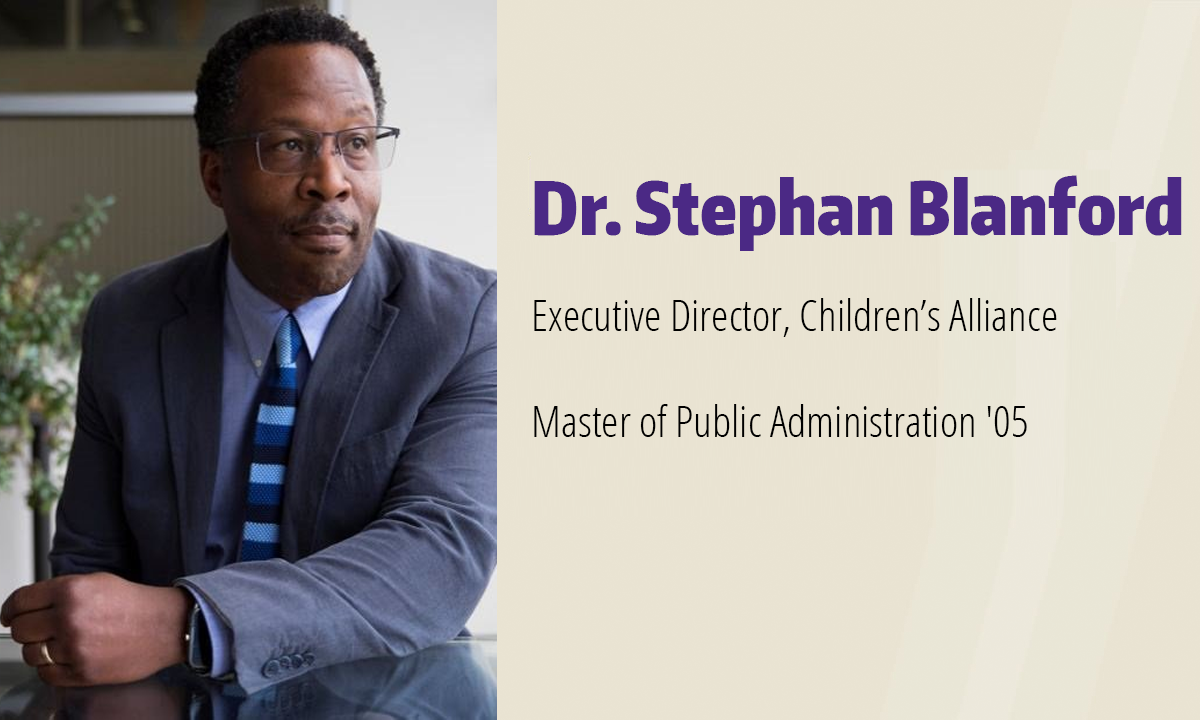As the Executive Director for Children’s Alliance, what is one advocacy and policymaking issue for children and families you are most passionate in solving (and why)?
Immediately upon assuming my role this summer, many stakeholders across the state alerted me to the perilous condition of childcare and early learning providers as a result of COVID-19. Since then, I’ve spoken to many members of the Washington Congressional delegation, State Legislators, philanthropists and department heads, trying to inform them how inattention to this issue will have long term consequences for our efforts to improve academic outcomes for all Washington’s children and imperil efforts to restart the state’s economy.
What contributed to your decision to pursue a career in support of the public good? Was there a defining moment in particular?
In all of the papers that I wrote at the Evans School (as well as my subsequent doctoral studies), I was interested in understanding the root causes of the inequities that we see in society, and the most potent strategies that leaders can use to address them. There has been no defining moment for this pursuit, but I frequently think about the emotions I felt while freezing on the National Mall with my family in January 2009, watching the first Obama Inauguration. It motivated me to pursue elective office myself (serving on the Seattle School Board), and has fueled my subsequent work, culminating in this new role.
What do you think the state of your field/organization will be in 2030? What will be the same, and what will be different?
I suspect that because of this summer’s civil unrest, statewide childhood advocacy organizations will continue to shift their stance towards advocacy for children and families furthest from racial and social justice. For too long, these advocates and the institutions they targeted have pushed policies that did not take into consideration the historic neglect that many communities have faced, and have subsequently exacerbated gaps in outcomes. Hopefully, this is changing, and state legislatures are ready to listen to more racially equitable policy recommendations. I also hope that childhood advocacy organizations will adopt the stance taken by Children’s Alliance that we advocate “with children, families and communities and not for them.”
What is something you have been most proud of, professionally?
I’m probably most proud of my school board service – that I was elected with a record-setting margin of victory in a citywide race, and that I stayed true to my campaign pledge to think about and work on behalf of students who had been least well served by the school district. It meant that I was frequently ostracized by my colleagues and was on the losing end of too many 6-1 votes. But eventually, I was a part of some significant strides made by the district to focus on historically underserved students. It was the most difficult role I’ve ever held, but I feel that my sacrifice resulted in some positive progress.
What is the “GOAT” (greatest of all time) book you’ve read?
I am part of a BIPOC book group studying Ibram Kendi’s “How To Be An Antiracist” and trying to apply its principles to our respective positions of leadership. Given the tumultuous times that we are in, the book has been particularly instructive, challenging and revelatory, and I encourage all Evans School students and alumni to expose themselves and their practices to the concepts of anti-racist leadership in that book and other like it.
Who has been your strongest influence in life? Why?
The example set by my uncle, Staff Sergeant Clifford C. Sims, has been my biggest influence on my professional career. His story is almost unbelievable – after being orphaned and enduring a childhood of profound deprivation, he was drafted and served in Vietnam, where he made the ultimate sacrifice for others, throwing himself on an enemy grenade and saving the lives of many of his troops during a battle in Hue, Vietnam. He was given the highest award that a soldier could receive, the Congressional Medal of Honor, there is a large exhibit in his honor at the National Museum of African American History and Culture in Washington DC, and his example continues to inspire me to work on behalf of others.
If you could give Evans School students one piece of advice, what would it be?
The skills that you will acquire and the talents you can unleash as a result of enrollment in the Evans School are desperately needed in Washington State, the U.S. and the rest of the world. I hope that you never lose sight of the practical application of the theories that you’ve mastered, and how they can (and should be) brought to bear on some of society’s biggest problems.
